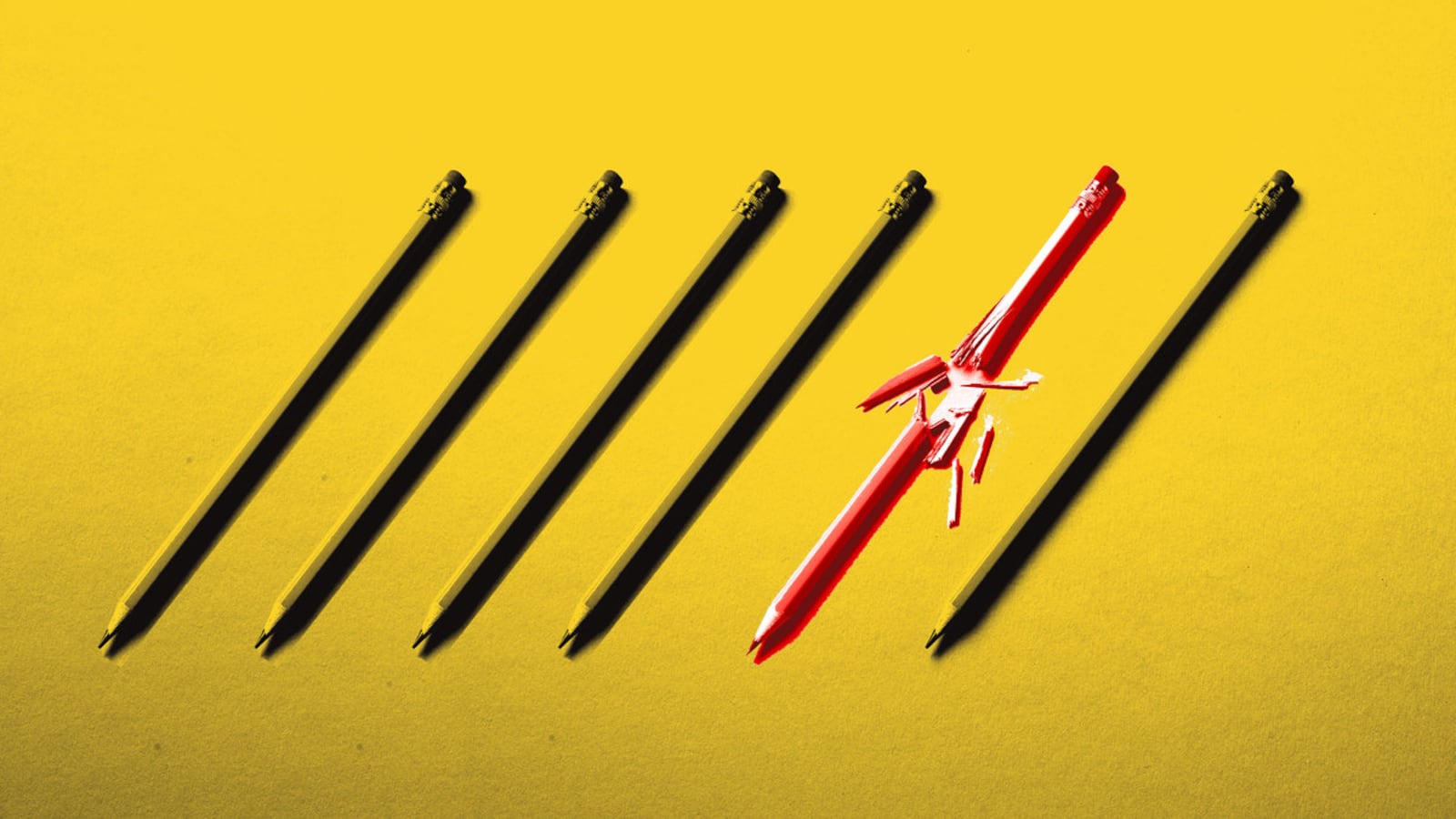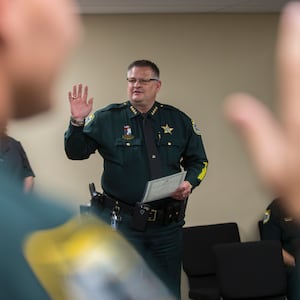Two weeks ago, Brevard County, Florida, Sheriff Wayne Ivey stood at a podium set in front of the local jail and its barbed-wire fences and suggested that children were not sufficiently terrified of getting in trouble at school.
“They know they’re not going to be given after-school detention, they’re not going to be suspended,” Ivey, whose school-based officers carry long guns, declared. “They’re not going to be expelled or, like in the old days, they’re not gonna have the cheeks of their ass torn off for not doing right in class.”
The statement—made alongside newly installed far-right school board chair Matt Susin—ushered into public view a simmering conflict over safety and student discipline at one of the larger districts in the country.
Teachers were begging for help managing their classrooms and for protection from harm, a request made all the more pressing by dozens of faculty departing the Orlando-area school system in recent weeks, according to the teachers’ union. Meanwhile, some parents decried what they said was already-disproportionate use of discipline on their children.

Matt Susin, school board chair
Matt Susin/FacebookBut for one Brevard County mother, who asked that only her first name be used for fear of retaliation against her family, the rhetoric was not hypothetical bluster. It was the spark for existential dread.
“So I’m going to jail if I act up?” her son, who is in elementary school, asked at home as he watched the news in late November, his mother, Heather, told The Daily Beast.
“Yeah,” his dad answered.
Immediate suspension
About a week later, her son, who has special needs, had a disruptive outburst in class, Heather said.
“I got a call from the school and they said immediate suspension,” the mother told The Daily Beast. “And I said, ‘What?’ And they said, ‘Well, yeah, he’s suspended.’ And I said, ‘Why is he suspended? … I’ve heard kids doing much worse in middle school and in high school, and they go back to class.’”
“It’s the new discipline policy,” Heather said she was told.
Heather’s son did not go to jail, and the school system has not officially enacted a new policy. But the recent announcement and her child’s experience have cemented a fear of what the new regime might look like.
“I’m so afraid that this new discipline policy is going to make it so much easier for them to just kick them out,” she told The Daily Beast.
<p><strong><em>Know something we should about schools? Reach out to Eileen Grench at Eileen.Grench@TheDailyBeast.com or securely at eileen.grench@protonmail.com.</strong></em></p>
In a statement, Russell Bruhn, the school district communications officer, told The Daily Beast, “Behavior and discipline is important to our School Board and that is why they have begun focusing even more time and energy on the topic. It is a complex issue with no easy fix or answer.”
“Our goal as a school district will always be to provide the best learning environment possible, and we call on everyone in our community to help make that happen,” he later added.
The school district has stayed vague about its plans, despite promises to get more specific. The district has also has not explicitly disavowed corporal punishment of the sort the sheriff hinted at, though it has suggested a resort to violence is not on the table right now.
The district did not respond to questions from The Daily Beast for any changes that have been recently implemented. A spokesperson for the sheriff’s office did not respond to a request for comment for this story.
Shift to the right
On Dec. 8, the Brevard County School Board held a seven-hour-long meeting on discipline—one that featured Sheriff Ivey, alongside board members, the local NAACP, and the teacher’s union.
There, incoming South Brevard NAACP President Ronnie Jackson Jr. tangled with the sheriff. Jackson pushed back on what he called Ivey’s “bullying” and “scare tactics,” decried already disproportionate discipline on Black children, and condemned the law enforcement boss calling kids “snot nosed” and “clowns.”
“Let him ramble,” Ivey said when Susin, the board chair, tried to cut in.

Brevard County Sheriff Wayne Ivey, right, meets with then-nominee Donald Trump in 2016.
Jonathan Ernst/ReutersA tough-talking Florida sheriff is one thing. But the district has also been roiled by the ascent of Moms for Liberty, an ultra-right-wing group that began locally before going national as part of an effort to reshape education.
After this year’s election, the increasingly right-wing Brevard school board fired the superintendent and issued a policy blocking students from using the bathroom that aligns with their gender identity—leading to nationwide scrutiny.
The rant from the sheriff relit the tinder box–and buoyed calls from teachers for help with discipline in their classrooms.
“We believe that all our teachers and staff should have the right to come to work without being the victims of violence or abuse,” Brevard Federation of Teachers President Anthony Colucci told The Daily Beast.
Colucci described a recent event where a fifth-grader hit a pregnant teacher and stole from another.
The union also called for better data on discipline and alternative methods to calm students. And even as he attempted to put some distance between teachers and the sheriff, he affirmed that teachers wanted law enforcement help in local schools.
“We don’t agree with the sheriff’s course language or his choice of location for that press conference, but we do know there is a massive discipline issue in this district that needs to be tackled,” he said.
‘Strike one—you’re out’
As the Dec. 8 board meeting fueled hours of debate, Heather said that she was watching on YouTube from home.
“I did hear [Sheriff] Ivey say the parents [need to be] involved, and I just wanted to reach through my little YouTube on my phone and say, ‘Dude, I am involved!’”
Heather said she does understand the need for more parental involvement in many cases of discipline. She also said that she had personally spent thousands on therapy, and that her son was one of the top test scorers in the state.
She said that perhaps it was “mama bear defense,” but that she feels like her child isn’t just being punished—but being pushed out.
“All of these discipline policies seem to be directing these children to believe that everybody needs to be just like them. And if anybody is different, they’re gonna get kicked out. And we’ll just keep this very streamlined Stepford school,” she said.
“And then, when they get to the real world and college and everything, what’s going to happen? They are the ones who have an [individualized education program] or whatnot, are not going to be taught how to adapt. They’re just gonna be kicked out and go to the, you know, school-to-prison pipeline, or school-to-mental-hospital pipeline for a lot of these kids.”
Heather is far from alone.
Members of the local NAACP told The Daily Beast they worried that calls for more punishment were overshadowing a large learning gap for Black children.
In an analysis of district data, the NAACP chapter’s Education Information Chair Bryan Bernard said he found that Black kids represented 15 percent of the student population but accounted for at least 30 percent of disciplinary referrals. And, he said, 64 percent of Black children were one to two grade levels behind.
“There is an obedience concern. However, I do not agree that it warrants police presence and monitoring,” Bernard’s colleague, Jackson Jr., told The Daily Beast. In Jackson’s view, the difference between dealing with cop rather than a teacher when being disciplined “could be life-changing” for a child.
According to a statement sent to The Daily Beast from the ACLU of Florida, Brevard County removed over 7,000 children like Heather’s son from class during the 2021-22 school year through suspensions and expulsions. Ninety-four students were also arrested at school—16 for “disorderly conduct.”
As for Heather, she doesn’t want to pull her child out of school. But since the suspension, she said, she has begun to seriously consider leaving. She hopes that by sharing her story, she can make a difference for other families and children with disabilities, or those who don’t “fit into the little square peg in the little square hole.”
Most of all, Heather told The Beast, she was calling for “more empathy.” She also called for more community support for kids who don’t have parents who can help, noting that she would volunteer to take others under her wing.
“We can’t just say, ‘Hey, you’re bad, you get out,’ You know. Or ‘strike one, you’re out.’ That's what it felt like to me last week—strike one, you’re out.”





